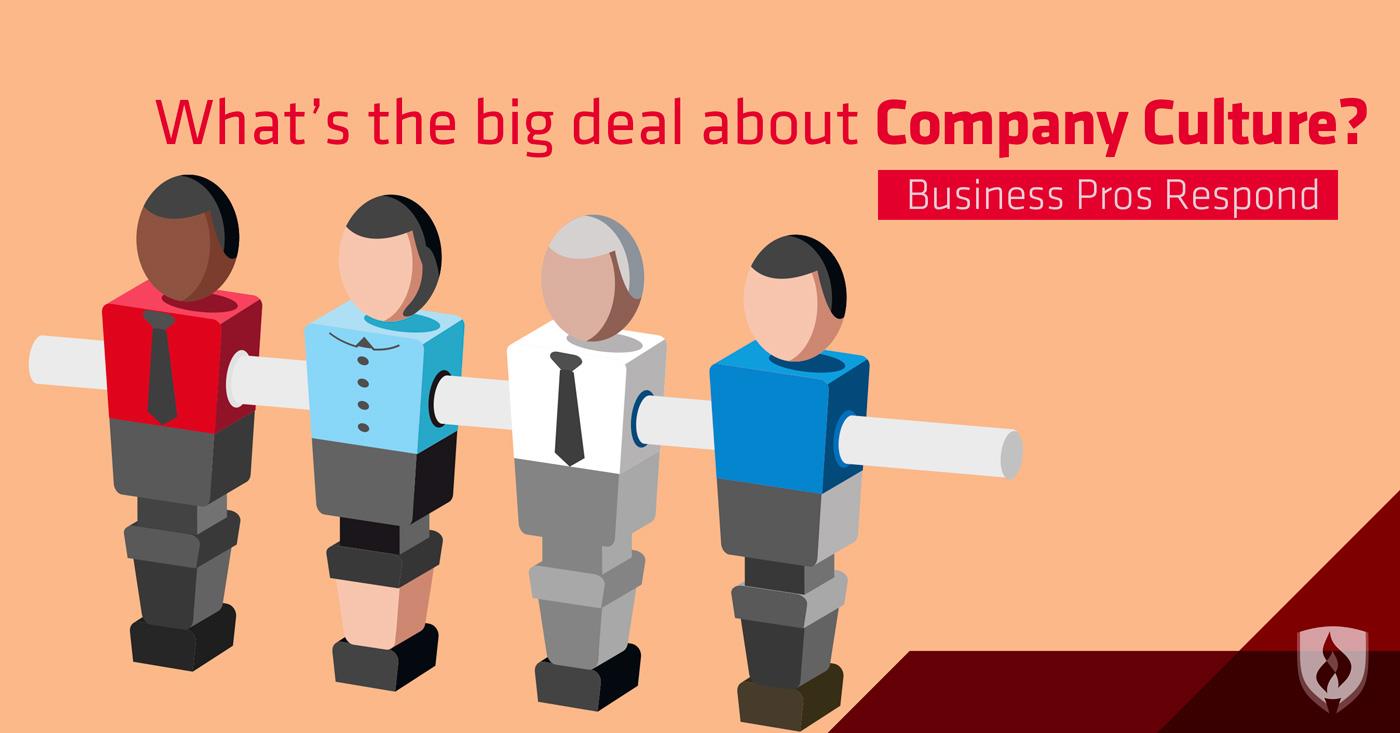What's the Big Deal About Company Culture? Business Experts Respond
By Brianna Flavin on 01/11/2017

The phrase “company culture” seems to be on everyone’s lips these days. As with many business terms, frequent use can eventually obscure the meaning. You might need to ask what company culture is before you can even get at what makes a good company culture.
“Culture is everywhere. It always exists,” says Matt Cholerton, founder of Ping Labs. Cholerton says company culture impacts everything the company does, from how information about work is shared, recognition, pay, how projects are assigned, how new people are hired, and what opportunities employees have.
“Culture is critically important,” says entrepreneur-mentor and author Mark Sephton. “It’s the environment in which we perform, and it shapes performance.” As companies realize that success or failure can come down to culture, questions about how to create a good company culture abound.
To understand this important concept, along with its implications, we called on the experts.
Why does company culture matter?
“It’s the difference between an environment where you can breathe and express yourself and an environment that stifles you,” Sephton says. In other words, it makes all the difference in the world. Employees spend a good chunk of their lives at work. If that time feels cramped, stressed and toxic, some employees will leave. The employees who stay will clock in with low morale and low productivity, Sephton says.
“You’ll see more people taking sick days and cutting corners because they are demotivated by the culture.” This is obviously bad news for employee turnover and management, but Sephton emphasizes that it’s also bad news for the consumer, customer or client.
"You can't deliver good service from unhappy employees."
“The most important thing in business is reputation,” Sephton says. If your employees have lost heart, it won’t be long before your clients see it. “It spirals.”
Most employers would love to have happy employees, but for many, that desire isn’t a priority on par with customer satisfaction or profits. Although, according to Cholerton, it should be. When employees feel positive, productivity increases all around. “Every business outcome measured increases with people reporting a positive state. There is less burnout and less turnover.”
“You can’t deliver good service from unhappy employees,” says Brian Clayton, CEO of GreenPal. Clayton says when each member of the team shares ideals, it creates trust. “And when you have trust, you have loyalty.”
What does an awesome company culture look like?
Contrary to what many think, company culture is not about the frills and benefits. “Savvy CEOs have learned that the new generation of hot employees want more than perks,” says Andrew Grauer, founder of Course Hero. “Frankly, when it comes to talent, it’s going to take more than a ping pong table and free cocopuffs to get the cream of the crop.”
A mountain of data indicates that employees these days value deeper cultural factors than a nice workspace, according to Catherine Shovlin of Synthetron. Shovlin says employees’ most common answers for what they value in a company culture are...
A clear sense of direction
Employees want to feel a sense of ownership and pride in their company. But if the ship feels like it’s sailing in circles, that enthusiasm will suffer. Clayton has observed startups attempting to emphasize company culture before their business fundamentals are even in place. But the whys, wheres and hows of a company’s mission are crucial to culture.
Consistent values
These should be “not just written on the wall, but lived from the CEO down,” Shovlin says. Sephton points out that lived company values always start with leadership. “You have to have a great self-awareness of who you are. The rest of the culture will be impacted.”
Openness to improvements and suggestions
“A culture of open sharing and collaboration is essential to help employees succeed,” Grauer says. This kind of collaborative attitude can be built into the way a workplace functions. This allows employees to truly influence the company. As an example, Grauer’s company offers optional hackathons to let employees build or organize the tools and systems their company will use.
Healthy work-life balance
“This one is shifting slightly,” Shovlin says. “It used to be about leaving work on time or having maternity leave. We see millennials not minding work encroaching on their life so long as they identify with their work and are glad to be part of it.”
Recognition
This is less about promotion and more about appreciation from direct supervisors when employees have gone the extra mile or completed great work, Shovlin says.
Sephton sees this component of company culture as one most corporations overlook when hiring managers. The most inspiring CEO imaginable won’t make up for the mechanical and unappreciative line manager you report to every day.
“Managers tend to be strong in establishing order, but too many of them don’t actually like people,” Sephton says. “We quit because of who we’re working for — it’s people. It’s not just something in the air. It’s in the hearts of men and women and how they communicate.”
How do you build a good company culture?
So how can you create this valuable, open and successful company culture? “Unless you are willing to bring who you are to the table, it doesn’t work,” Sephton says. “The right culture is about respecting people. You have to care about your employees and your customers.”
Be intentional
Sephton adds that intentionally establishing a company culture at the beginning of a new business is key. “Start with the end in mind. You’ve got to decide what you want your business to look like.”
Live the ideals
When you do decide on the qualities you want your workplace to embody, you have to do better than paying them lip-service. Jennifer Williamson of Quigley Fine Wines worked as a CEO in the nonprofit sector and truly wanted her employees to have a healthy work-life balance.
“I kicked everyone out at 5 pm, every day. I made sure my people knew it mattered. I knew it started with me. If we did have to work on a weekend, I was right beside my team.”
Validate people and hire managers who do likewise
Williamson intentionally created a culture of recognition, paying attention to achieved goals and hard work. “I thanked my people daily.”
"If you can't break bread with the person, then why hire them?"
“People tend to recruit based on ability and skill, not on culture and attitude,” Sephton says, adding that a company that truly prioritizes culture will hire candidates with the right outlook and personality, knowing they can teach job skills easier than change attitudes.
When you hire managers, Sephton advises, hire the candidates who genuinely like people. “Hire leaders. Hire someone who knows how to interact and encourage.” Clayton expands that idea to any employee your company brings on. “If you can’t break bread with the person, then why hire them?”
Real culture comes down to united belief and purpose, Clayton says. “With these elements embedded in a team, no matter how big or small, there is no limit to what can be accomplished.”
What’s your ideal company culture?
If you are inspired by the thought of building a company culture where employees feel valued and empowered, you might have the makings of an excellent boss, a thoughtful entrepreneur, or the best human resources hire a company could make.
Human resources isn’t always the first department business-minded people think of, but those who dive in find plenty to love. Check out 7 Signs You Should Be Working in HR to see if your appreciation for people in the workplace is career-worthy.
RELATED ARTICLES:




